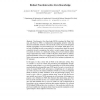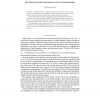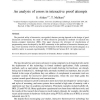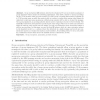1401 search results - page 9 / 281 » Randomness in Interactive Proofs |
107
Voted
CRYPTO
2001
Springer
15 years 6 months ago
2001
Springer
Abstract. Non-Interactive Zero Knowledge (NIZK), introduced by Blum, Feldman, and Micali in 1988, is a fundamental cryptographic primitive which has attracted considerable attentio...
109
Voted
DCC
2005
IEEE
16 years 1 months ago
2005
IEEE
Signcryption [35] is a public key primitive that achieves the functionality of both an encryption scheme and a signature scheme simultaneously. It does this more efficiently than a...
108
click to vote
ICASSP
2011
IEEE
14 years 5 months ago
2011
IEEE
This work focuses on the convergence analysis of adaptive distributed beamforming schemes that can be reformulated as local random search algorithms via a random search framework....
101
Voted
IWC
2000
15 years 1 months ago
2000
The practical utility of interactive, user-guided, theorem proving depends on the design of good interaction environments, the study of which should be grounded in methods of rese...
102
Voted
ASIACRYPT
2009
Springer
15 years 8 months ago
2009
Springer
Group encryption (GE) schemes, introduced at Asiacrypt’07, are an encryption analogue of group signatures with a number of interesting applications. They allow a sender to encryp...




